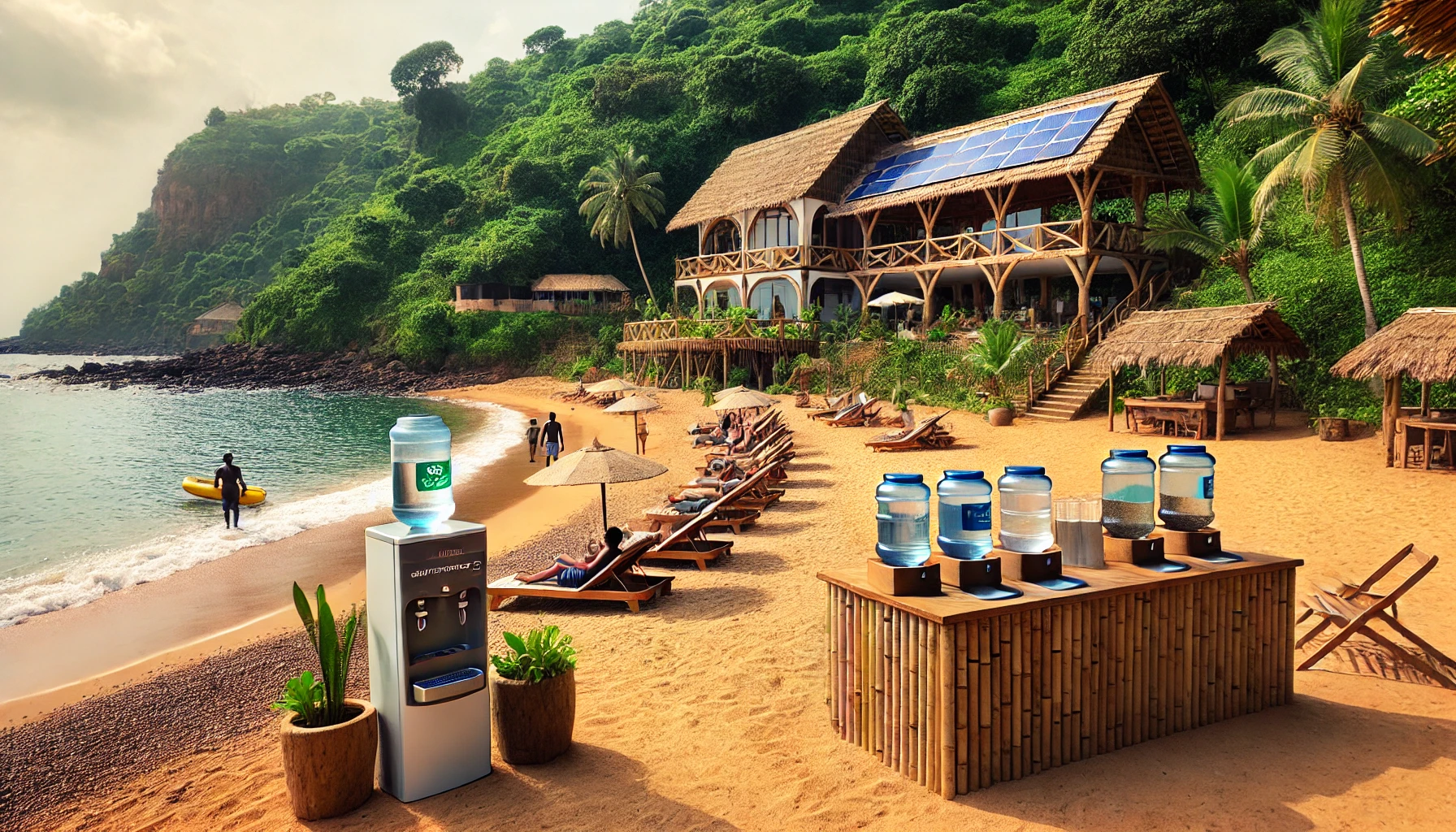Reducing Plastic Footprints: World Bank’s Vision for a Greener Tourism Sector in Sierra Leone
The World Bank’s "Single-Use Plastic Reduction Guidelines" for hotels and restaurants in Sierra Leone aim to reduce plastic waste by promoting sustainable alternatives, fostering collaboration among stakeholders, and supporting the tourism industry’s shift towards a circular economy. The initiative addresses key environmental challenges posed by single-use plastics and offers practical solutions for the sector's transition to sustainability.

The World Bank's "Single-Use Plastic Reduction Guidelines for Hotels and Restaurants," developed as part of the Sierra Leone Circular Economy in Plastics for Sustainable Tourism and Economic Diversification Project, with contributions from Antea ECG and VDI/VDE Innovation Technik GmbH, aims to tackle the growing issue of plastic waste in the tourism sector, particularly in Sierra Leone. This project is supported by the World Bank’s PROBLUE trust fund, which focuses on sustainable marine and coastal resource development. The production of plastic has skyrocketed over the last century due to its cost-effectiveness, durability, and versatility, but this has also led to an enormous environmental challenge. Globally, only about 15% of plastic waste is recycled, with the rest accumulating in oceans, landfills, and ecosystems, causing long-term damage. Sierra Leone, recognizing tourism as a critical pathway for economic development, has been grappling with the negative environmental impact of single-use plastics, particularly in light of COVID-19 health measures that have exacerbated plastic usage.
Tourism’s Contribution to Plastic Waste in Sierra Leone
The tourism sector in Sierra Leone is one of the most significant contributors to plastic waste, which, in turn, contributes to the country's marine litter problem. The most commonly used plastic items in the tourism sector include plastic bottles, bags, cutlery, and straws, which account for 77% of the plastic waste generated. According to a 2021 survey on plastic consumption, plastic bottles alone make up 28% of the waste, followed by plastic bags at 19%. This widespread use of single-use plastic (SUP) is particularly prevalent in hotels and restaurants, with plastic bottles and bags being the most problematic in hotels and plastic cutlery and straws posing challenges in restaurants. These items are often not recycled and contribute significantly to pollution. The guidelines emphasize that while plastics are a convenient solution for many aspects of tourism, there is a critical need to reduce the use of non-essential plastic items and shift towards reusable alternatives.
Circular Economy Strategy for Sustainable Tourism
The Sierra Leone Circular Economy in Plastics for Sustainable Tourism and Economic Diversification Project, led by the Ministry of Finance and the World Bank, seeks to reduce plastic consumption by promoting circular economy strategies that are both sustainable and environmentally friendly. The guidelines developed under this project are intended to help hotels and restaurants reduce their use of SUPs by offering a systematic approach to plastic management. The four key stages of the strategy include conducting a self-assessment to identify plastic consumption, creating a reduction plan, developing a single-use plastic reduction policy, and evaluating the progress made. Hotels are encouraged to analyze their current plastic usage, identify the most harmful items, and prioritize reducing or eliminating them. For example, the guidelines suggest replacing plastic water bottles with glass bottles or installing water dispensers, using reusable cutlery instead of plastic, and eliminating unnecessary plastic items like straws.
Practical Tools and Strategies for Hotels
The guidelines also offer practical tools and strategies tailored to the Sierra Leonean context. Attachment 1 of the guidelines provides detailed lists of the most commonly used plastics in hotels and restaurants, along with tools for calculating plastic consumption and costs. It also includes a list of potential alternatives to plastic items, which can be implemented in various hotel departments, depending on local availability and feasibility. For example, the replacement of plastic water bottles with glass bottles is suggested as a viable alternative, though challenges such as manufacturing glass bottles locally and improving transport infrastructure must be addressed. The guidelines also promote the 4-Rs principle – Remove, Reduce, Replace, and Recycle – to help hotels manage their use of plastics. By adopting these principles, hotels can remove unnecessary single-use plastic items, reduce consumption, replace them with reusable alternatives, and recycle where possible.
Engaging Stakeholders for a Sustainable Future
Communication and stakeholder involvement are key aspects of the guidelines. Hotels are advised to train their staff, inform guests about their sustainability goals, and engage suppliers in the process of reducing plastic use. Suppliers, for instance, can help by reducing plastic packaging or offering products in bulk, which can significantly cut down on the amount of plastic waste generated. Engaging with local waste collectors and recycling stations is also crucial for ensuring that the remaining plastic waste is managed responsibly. The guidelines stress that success in reducing plastic waste requires collaboration between all stakeholders, including staff, guests, suppliers, and local authorities.
A Roadmap for Cleaner Tourism in Sierra Leone
The World Bank's guidelines reflect the growing global awareness of the environmental impact of SUPs and the need for urgent action in the tourism industry. By focusing on practical, achievable steps, these guidelines aim to make it easier for hotels and restaurants in Sierra Leone to reduce their reliance on plastic and move toward more sustainable business models. The broader goal of the project is to improve the country’s attractiveness as a tourist destination while mitigating the environmental damage caused by plastic waste. Although some challenges remain, such as the high costs of alternatives and the underdeveloped recycling infrastructure, the guidelines provide a roadmap for a cleaner, more sustainable tourism sector in Sierra Leone. Through collective efforts, the tourism industry can significantly reduce its plastic footprint and contribute to a healthier environment.
- FIRST PUBLISHED IN:
- Devdiscourse
ALSO READ
Sierra Leone and EU Partner to Strengthen Governance and Development Agenda
Supreme Court Reviews Vaccine-Induced Deaths Amidst COVID-19 Crisis
ICMR Study Finds COVID-19 Vaccination Lowers Risk of Sudden Death in Young Adults
Italy's U-turn on COVID-19 Fines: A Controversial Decision
Italy's Economic Woes in the Wake of COVID-19: A Stark Contrast with Spain










